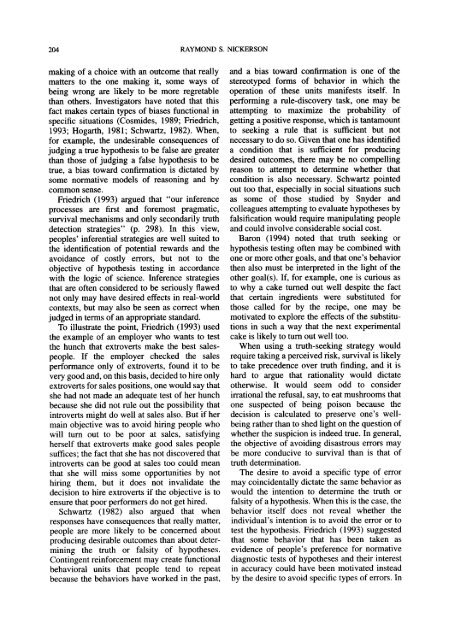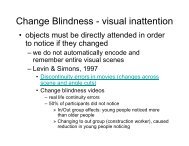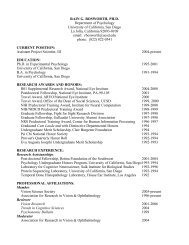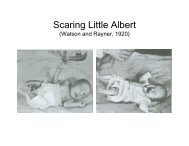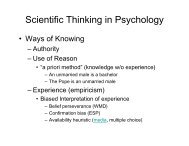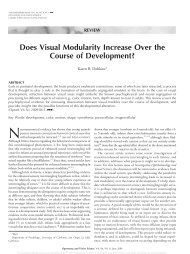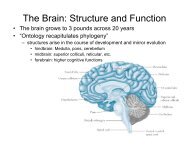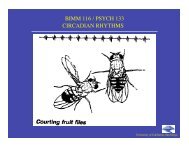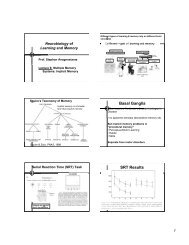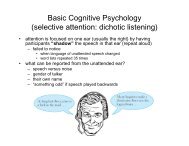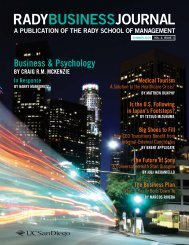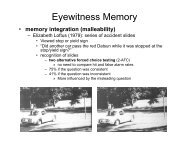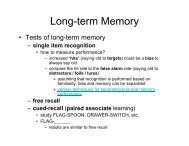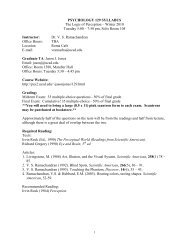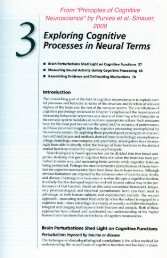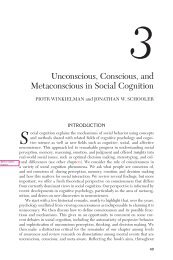Confirmation Bias: A Ubiquitous Phenomenon in Many Guises
Confirmation Bias: A Ubiquitous Phenomenon in Many Guises
Confirmation Bias: A Ubiquitous Phenomenon in Many Guises
Create successful ePaper yourself
Turn your PDF publications into a flip-book with our unique Google optimized e-Paper software.
204 RAYMOND S. NICKERSON<br />
mak<strong>in</strong>g of a choice with an outcome that really<br />
matters to the one mak<strong>in</strong>g it, some ways of<br />
be<strong>in</strong>g wrong are likely to be more regretable<br />
than others. Investigators have noted that this<br />
fact makes certa<strong>in</strong> types of biases functional <strong>in</strong><br />
specific situations (Cosmides, 1989; Friedrich,<br />
1993; Hogarth, 1981; Schwartz, 1982). When,<br />
for example, the undesirable consequences of<br />
judg<strong>in</strong>g a true hypothesis to be false are greater<br />
than those of judg<strong>in</strong>g a false hypothesis to be<br />
true, a bias toward confirmation is dictated by<br />
some normative models of reason<strong>in</strong>g and by<br />
common sense.<br />
Friedrich (1993) argued that "our <strong>in</strong>ference<br />
processes are first and foremost pragmatic,<br />
survival mechanisms and only secondarily truth<br />
detection strategies" (p. 298). In this view,<br />
peoples' <strong>in</strong>ferential strategies are well suited to<br />
the identification of potential rewards and the<br />
avoidance of costly errors, but not to the<br />
objective of hypothesis test<strong>in</strong>g <strong>in</strong> accordance<br />
with the logic of science. Inference strategies<br />
that are often considered to be seriously flawed<br />
not only may have desired effects <strong>in</strong> real-world<br />
contexts, but may also be seen as correct when<br />
judged <strong>in</strong> terms of an appropriate standard.<br />
To illustrate the po<strong>in</strong>t, Friedrich (1993) used<br />
the example of an employer who wants to test<br />
the hunch that extroverts make the best salespeople.<br />
If the employer checked the sales<br />
performance only of extroverts, found it to be<br />
very good and, on this basis, decided to hire only<br />
extroverts for sales positions, one would say that<br />
she had not made an adequate test of her hunch<br />
because she did not rule out the possibility that<br />
<strong>in</strong>troverts might do well at sales also. But if her<br />
ma<strong>in</strong> objective was to avoid hir<strong>in</strong>g people who<br />
will turn out to be poor at sales, satisfy<strong>in</strong>g<br />
herself that extroverts make good sales people<br />
suffices; the fact that she has not discovered that<br />
<strong>in</strong>troverts can be good at sales too could mean<br />
that she will miss some opportunities by not<br />
hir<strong>in</strong>g them, but it does not <strong>in</strong>validate the<br />
decision to hire extroverts if the objective is to<br />
ensure that poor performers do not get hired.<br />
Schwartz (1982) also argued that when<br />
responses have consequences that really matter,<br />
people are more likely to be concerned about<br />
produc<strong>in</strong>g desirable outcomes than about determ<strong>in</strong><strong>in</strong>g<br />
the truth or falsity of hypotheses.<br />
Cont<strong>in</strong>gent re<strong>in</strong>forcement may create functional<br />
behavioral units that people tend to repeat<br />
because the behaviors have worked <strong>in</strong> the past,<br />
and a bias toward confirmation is one of the<br />
stereotyped forms of behavior <strong>in</strong> which the<br />
operation of these units manifests itself. In<br />
perform<strong>in</strong>g a rule-discovery task, one may be<br />
attempt<strong>in</strong>g to maximize the probability of<br />
gett<strong>in</strong>g a positive response, which is tantamount<br />
to seek<strong>in</strong>g a rule that is sufficient but not<br />
necessary to do so. Given that one has identified<br />
a condition that is sufficient for produc<strong>in</strong>g<br />
desired outcomes, there may be no compell<strong>in</strong>g<br />
reason to attempt to determ<strong>in</strong>e whether that<br />
condition is also necessary. Schwartz po<strong>in</strong>ted<br />
out too that, especially <strong>in</strong> social situations such<br />
as some of those studied by Snyder and<br />
colleagues attempt<strong>in</strong>g to evaluate hypotheses by<br />
falsification would require manipulat<strong>in</strong>g people<br />
and could <strong>in</strong>volve considerable social cost.<br />
Baron (1994) noted that truth seek<strong>in</strong>g or<br />
hypothesis test<strong>in</strong>g often may be comb<strong>in</strong>ed with<br />
one or more other goals, and that one's behavior<br />
then also must be <strong>in</strong>terpreted <strong>in</strong> the light of the<br />
other goal(s). If, for example, one is curious as<br />
to why a cake turned out well despite the fact<br />
that certa<strong>in</strong> <strong>in</strong>gredients were substituted for<br />
those called for by the recipe, one may be<br />
motivated to explore the effects of the substitutions<br />
<strong>in</strong> such a way that the next experimental<br />
cake is likely to turn out well too.<br />
When us<strong>in</strong>g a truth-seek<strong>in</strong>g strategy would<br />
require tak<strong>in</strong>g a perceived risk, survival is likely<br />
to take precedence over truth f<strong>in</strong>d<strong>in</strong>g, and it is<br />
hard to argue that rationality would dictate<br />
otherwise. It would seem odd to consider<br />
irrational the refusal, say, to eat mushrooms that<br />
one suspected of be<strong>in</strong>g poison because the<br />
decision is calculated to preserve one's wellbe<strong>in</strong>g<br />
rather than to shed light on the question of<br />
whether the suspicion is <strong>in</strong>deed true. In general,<br />
the objective of avoid<strong>in</strong>g disastrous errors may<br />
be more conducive to survival than is that of<br />
truth determ<strong>in</strong>ation.<br />
The desire to avoid a specific type of error<br />
may co<strong>in</strong>cidentally dictate the same behavior as<br />
would the <strong>in</strong>tention to determ<strong>in</strong>e the truth or<br />
falsity of a hypothesis. When this is the case, the<br />
behavior itself does not reveal whether the<br />
<strong>in</strong>dividual's <strong>in</strong>tention is to avoid the error or to<br />
test the hypothesis. Friedrich (1993) suggested<br />
that some behavior that has been taken as<br />
evidence of people's preference for normative<br />
diagnostic tests of hypotheses and their <strong>in</strong>terest<br />
<strong>in</strong> accuracy could have been motivated <strong>in</strong>stead<br />
by the desire to avoid specific types of errors. In


